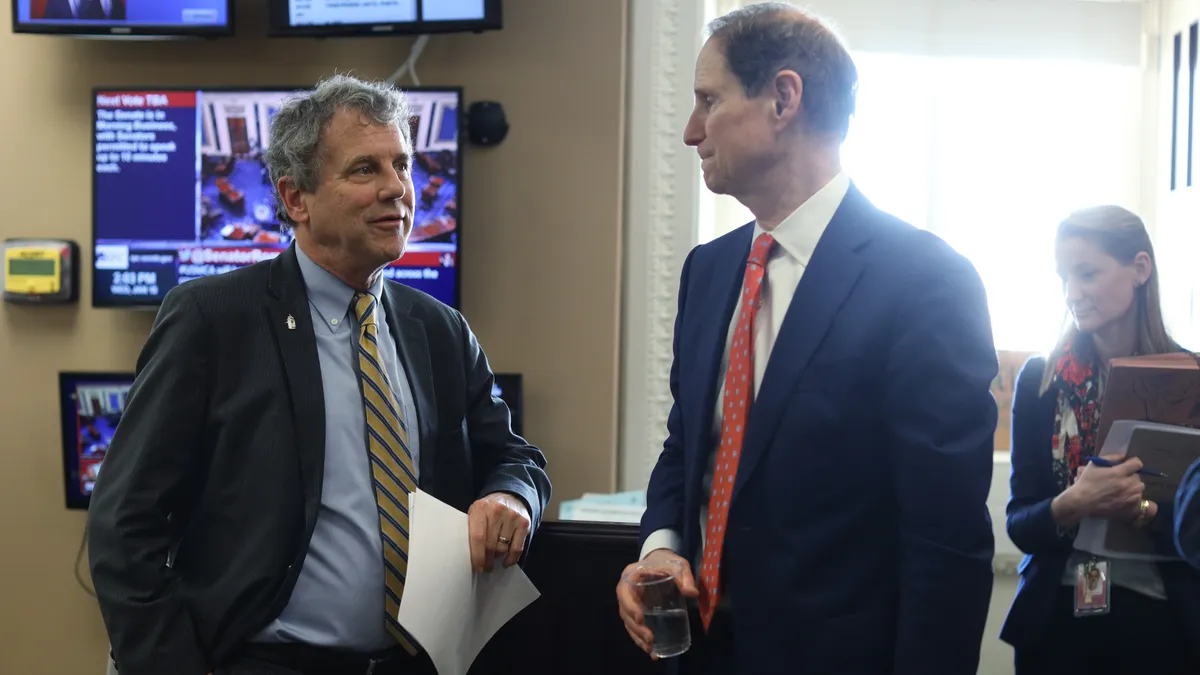When senators Ron Wyden (D-Ore.) and Sherrod Brown (D-Ohio) introduced their 2% tax on stock buybacks last week, they emphasized the proposal’s importance in getting companies to do the right thing: invest their cash in new productive capacity, wage increases, and research rather than in stock buybacks, which increase the value of their stock to shareholders by decreasing dilution.
“It’s past time Wall Street paid its fair share and reinvested more of that capital into the workers and communities who make those profits possible,” Brown said in announcing the Stock Buyback Accountability Act.
Wyden, who chairs the tax-writing Senate Finance Committee, said only about 15% of unspent capital in public companies goes into productive investment today, and there’s little expectation of that increasing without changes to tax law.
“Stock buybacks are currently heavily favored by the tax code, despite their skewed benefits for the very top and potential for insider game-playing,” said Wyden, who, along with Brown, called the 2017 Tax Cuts & Jobs Act part of the problem.
“After the 2017 Republican tax law, instead of higher job growth or a GDP surge, we saw corporations spending hundreds of billions of dollars buying back their own stock,” Brown said. “The big winners were rich shareholders, CEOs, and foreign entities, not American workers.”
That law cut the top corporate tax rate to 21% from 35%, among other things, leaving more money in the hands of businesses to spend in ways that fit their business plans.
Capex impediments
But CFOs say there are systemic hurdles in the economy that stand in the way of plowing more of their cash into capital expenditures — first among them, supply constraints.
“It wasn’t our intention to decrease our capex; it’s just been difficult to get tools,” Jim Sheehan, CFO of Hormel Foods, told The Wall Street Journal.
The company had set aside $300 million for new investment this year, including for a new plant in Nebraska, but it had to reduce that by $50 million in part because of the chip shortage “delaying shipments of equipment,” the Journal reported.
Talent shortages are just as big of a hurdle as material goods, CFOs say. Dave Denton, CFO of home-goods store Lowes, says the company doesn’t have the management capacity to deploy more than a portion of its capital in new investments.
“There [are] only so many projects that we can take on,” he told the Journal.
Last year the company set a $1.5 billion cap on its capital expenditures and plans to increase that to $2 billion next year, but in just the first six months of this year, it spent more than $6 billion on stock buybacks.
“We’re investing as much as the company can absorb,” Denton said.
Talent constraints are holding back new investment at C.H. Robinson as well. The transportation and logistics company spent less than $30 million so far this year on capital expenditures, compared to $286 million on buybacks.
“We are merely constrained by the lack of resources” — that is, a talent shortage, CFO Mike Zechmeister told the Journal. The unfunded projects gives the company “leftover money” for the buybacks, he added.
Money to spend
In just the first six months of this year, S&P 500 companies spent more than $370 billion on share repurchases, up almost 30% from the same time period last year, the Journal reported.
Meanwhile, capital expenditures saw less than a 5% increase in the same period, to about $337 billion. Looking ahead, the same group of companies has already announced an additional 115 stock repurchase programs, which would set aside another $360 billion for the purpose.
“The chip shortage has been a ticking time bomb,” the Harvard Business Review said earlier this year. “One of the biggest cautions to consider is whether supply chains will be able to keep up with growing demand.”
Apparently not. In their decisions, CFOs indicate supply chain constraints, alongside insufficient talent, are an insurmountable hurdle, which suggests a tax response to buybacks, at least partly, misses the mark.













